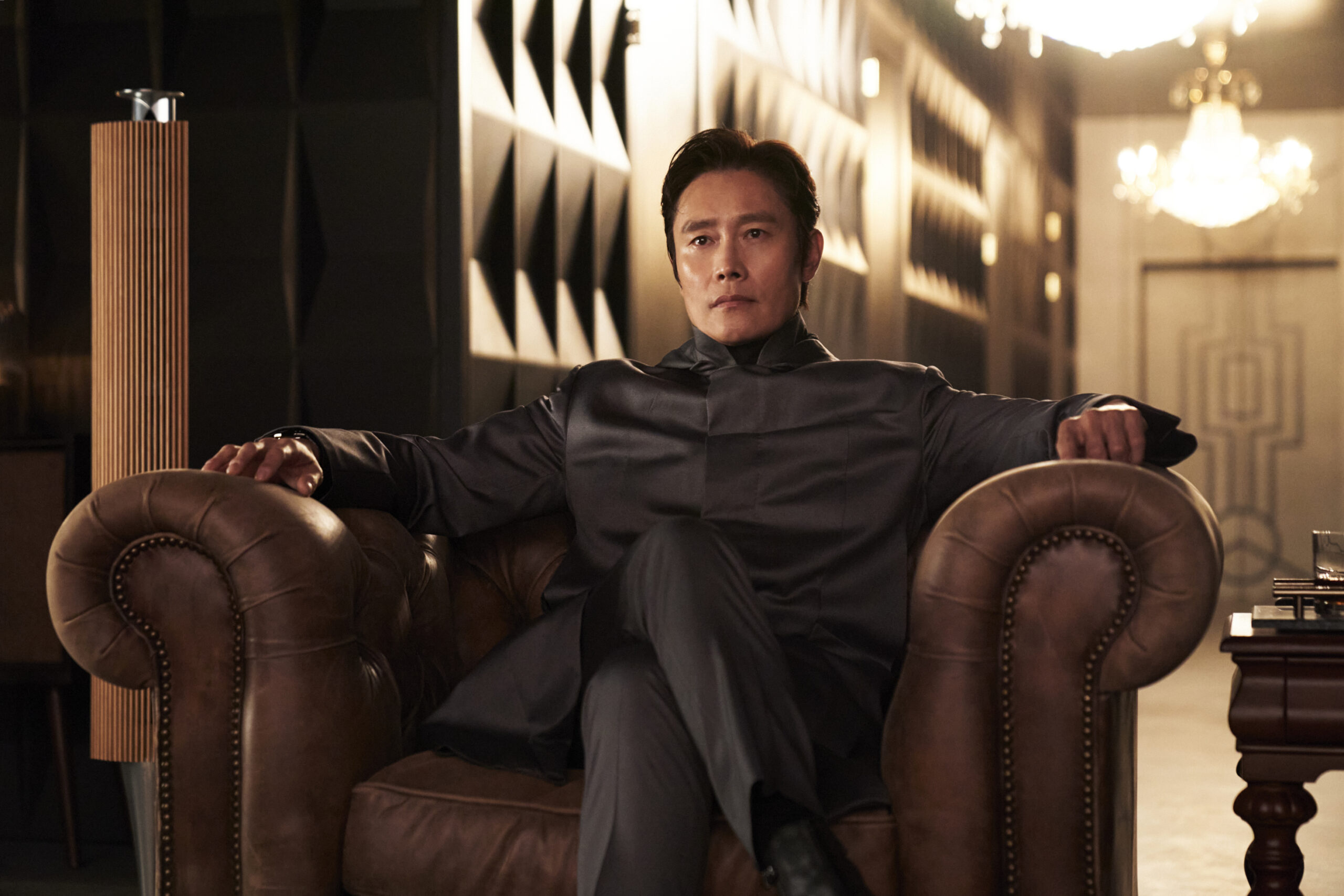The mysterious character known as the Front Man in “Squid Game” has become a central focus in the show’s second season. Lee Byung-hun, who portrays this masked villain, has a significantly expanded role in the new episodes. The Front Man not only continues his role as the overseer of the deadly games but also returns to the competition as Player 001 under the alias Young-il.
Fans of the hit Netflix series have been captivated by the Front Man’s complex character development. As the leader of all masked soldiers in pink jumpsuits, he demonstrates ruthless efficiency in managing the games. His character represents the cold, calculating nature of the organization behind the deadly competition that has fascinated viewers worldwide.
With speculation swirling about season 3, theories suggest major developments for this character. Some fans believe that Gi-hun might become the new Front Man, which could mean a dramatic end for the current one. Lee Byung-hun has mentioned feeling “much more loved” since taking on this role, highlighting how this villainous character has resonated with audiences despite his morally ambiguous nature.

The Front Man’s Shocking Identity Revealed
One of the biggest twists in Squid Game happens when the true identity of the Front Man is exposed. Throughout the first season, this masked figure appears as a cold, calculating overseer of the games. His presence is unsettling—a figure of power and menace, someone who answers only to the elusive VIPs. But the reveal? Absolutely gut-wrenching.
The Front Man is Hwang In-ho. Not just another faceless enforcer, but a former police officer and—more importantly—the missing brother of detective Hwang Jun-ho. Fans who followed Jun-ho’s secret investigation into the games in Season 1 probably pieced together the clues just moments before the heartbreaking reveal. In-ho had once participated in the games himself and actually won the competition years earlier. What drove him from survivor to sadistic mastermind is still murky, but that’s part of what makes his story so compelling.
The sibling dynamic adds a deeply personal element to the show’s themes of betrayal and survival. Jun-ho’s discovery doesn’t end in a tearful reunion. Instead, it’s a brutal confrontation that raises the stakes in unimaginable ways. Hwang In-ho’s decision to shoot his own brother—whether as a show of loyalty to the VIPs, or to maintain control—still fuels debates among fans about whether there’s redemption in his future.
Why Did Hwang In-ho Become the Front Man?
The question that lingers after the big reveal is: why would someone who escaped the games willingly run them?
Some fans believe In-ho’s motivations are grounded in the trauma of his experience. Winning the games might have granted him wealth, but it stripped him of his humanity. It’s possible that In-ho saw no way to reintegrate into the world outside and instead chose to embrace the very system that nearly destroyed him. Others argue he was seduced by power and status. After all, the Front Man answers only to the VIPs and wields immense control over life and death in the arena.
His police background adds another layer of irony. In-ho was once a protector of law and justice. Now, he orchestrates unspeakable brutality under the guise of entertainment. It’s a grim commentary on how the line between justice and cruelty can blur when survival and power are at stake.
What We Know About the Front Man in Season 2
Season 2 of Squid Game pulls back the curtain even further. Hwang In-ho is back, but this time he’s not just the Front Man. He infiltrates the new games as Player 001 under the alias Oh Young-il. This is a huge twist. Fans who thought In-ho had settled into his role as a cold administrator are surprised to see him back in the thick of the competition.
Why return? Some believe it’s a way to maintain control from the inside. Others think he’s testing something—or someone. His interactions with Seong Gi-hun (Player 456) suggest that In-ho is playing a much deeper game. Their relationship starts out friendly but quickly turns into a dangerous power struggle. In-ho’s betrayal of Gi-hun is another stark reminder that in Squid Game, trust is a luxury no one can afford.
Season 2 also teases more about his relationship with Jun-ho. Rumors and leaks suggest that Jun-ho survived their confrontation in Season 1. If that’s true, the brothers’ unfinished business could take center stage in Season 3.
What’s Next for the Front Man in Season 3?
With Season 3 set to drop on June 27, 2025, theories are running wild about where In-ho’s story will go next. Will we finally get flashbacks showing his descent from game winner to Front Man? Could there be redemption? Or will he double down and become the ultimate villain?
There’s also the unresolved thread of his brother. If Jun-ho is alive, a showdown seems inevitable. And if Gi-hun is coming back for revenge, In-ho could find himself caught between his loyalty to the VIPs and the ghosts of his past.
What’s clear is that Hwang In-ho is no one-note villain. He’s one of the most complex and tragic characters in Squid Game, a man whose choices are shaped by trauma, power, and survival. His journey isn’t over. If anything, the games are just getting started.
Key Takeaways
- Lee Byung-hun’s Front Man character plays a dual role in season 2 as both the games’ overseer and as Player 001 named Young-il.
- The Front Man serves as the ruthless leader of the masked soldiers who enforce the deadly competition’s rules.
- Theories about season 3 suggest possible redemption or replacement of the Front Man character as the story continues to evolve.
Character Analysis of the Front Man
The Front Man stands as one of the most enigmatic characters in “Squid Game,” with layers of complexity that have been revealed across the series. His dual identity and mysterious nature contribute significantly to the show’s dramatic tension.
Portrayal and Performance by Lee Byung-Hun
Lee Byung-Hun brings remarkable depth to his portrayal of the Front Man in “Squid Game.” His performance is particularly noteworthy in the second season, where he takes on a dual role. Lee not only continues as the masked leader but also participates in the deadly competition as Player 001, using the alias “Young-il.”
This acting challenge allowed Lee to showcase his versatility, playing both the cold, calculating overseer and a vulnerable contestant. The contrast between these personas creates compelling dramatic tension throughout the season.
Lee described this complex role as “an acting delight,” appreciating the opportunity to explore different dimensions of the character. His subtle portrayal reveals the psychological complexity beneath the iconic black mask.
The Front Man’s Role in ‘Squid Game’
The Front Man serves as the operational leader of the deadly competition, overseeing the games with precision and detachment. His position represents the administrative face of the organization, executing the vision while maintaining order among both contestants and staff.
In the first season, he remained mostly mysterious, his identity concealed behind the geometric mask. The second season expands his significance by positioning him as Player 001 under the name “Young-il.”
This infiltration creates an interesting dynamic, especially with Gi-hun, who “doesn’t know that Player 001 is the Front Man, so he thinks that he’s someone he can trust and rely on.” This misplaced trust heightens the dramatic stakes.
The character embodies the cold efficiency of the game’s structure while hinting at deeper motivations that drive his participation in such a brutal system.
Exploring the Identity of Hwang In-Ho
Hwang In-Ho, the man behind the Front Man’s mask, carries a complex backstory that enriches the series’ narrative. His real identity adds layers to the character beyond simply being the competition’s administrator.
One compelling theory suggests that In-ho may be related to another key character in the series, potentially creating connections that tie the show’s mythology together. This speculation has fueled fan discussions about his true motivations and loyalties.
The revelation of his identity as Hwang In-ho provides context for his actions and suggests a personal journey from participant to overseer. The second season hints at a potential redemption arc for the character, suggesting that his story might evolve in the upcoming third season.
His transformation from ordinary citizen to the Front Man represents the corrupting influence of power and the system’s ability to turn victims into perpetrators.
Narrative Developments in ‘Squid Game’ Season 2
Season 2 of the Netflix hit series expands the shadowy world behind the deadly competition, with The Front Man’s character receiving significant development. The new season builds upon the foundation laid in Season 1 while introducing fresh challenges and bringing back familiar faces.
Continuation of The Front Man’s Storyline
The Front Man, revealed to be Hwang In-ho, receives substantial character development in Season 2. His role as the supervisor of the deadly games becomes more complex as viewers gain insight into his motivations and internal struggles.
In the new season, The Front Man continues to run the facility operations, as evidenced when he introduces himself to the VIPs in Episode 7. His character’s depth is explored through flashbacks and present-day scenes that illustrate his journey from winner to organizer.
Lee Byung-hun, who portrays The Front Man, has discussed his character’s internal conflict that persists throughout Season 2. This struggle reaches its peak in the final episodes, adding layers to what initially seemed like a straightforward villain.
New Challenges and Games Introduced
Season 2 brings a fresh set of deadly challenges designed by The Front Man under creator Hwang Dong-Hyuk’s vision. These games maintain the show’s signature blend of childhood nostalgia and brutal consequences.
Players face increasingly complex psychological and physical tests that push boundaries beyond what was seen in Season 1. The stakes are higher, with The Front Man implementing rule changes that add unpredictability to the competition.
These new games serve as both entertainment for the VIPs and as metaphors for social inequality—a theme that director Hwang Dong-Hyuk continues to explore throughout the Netflix series.
Returning Characters and Potential Allies or Rivals
Season 2 sees the return of Seong Gi-hun, now with a renewed purpose. His character directly challenges The Front Man’s authority by leading an uprising among the players.
This rebellion reaches a climactic point when The Front Man shoots Jung-bae dead as a response to Gi-hun’s uprising. This violent confrontation sets up the brewing war between the game’s administration and those seeking to destroy it.
Other returning characters establish new alliances and rivalries that complicate The Front Man’s control over the games. These relationships create a more intricate power dynamic that will likely continue into the already-planned Season 3.
The Impact of ‘Squid Game’ on Pop Culture
The Netflix series “Squid Game” transformed entertainment worldwide with its brutal portrayal of economic inequality and human desperation. Its distinctive visual style, characters, and themes sparked conversations across cultures while reshaping streaming content expectations.
‘Squid Game’ as a Global Phenomenon
When “Squid Game” debuted on Netflix, it quickly became the platform’s most-watched series in 94 countries. The show’s distinctive visuals—from the pink-suited guards to the giant robot doll—immediately entered global consciousness and appeared in Halloween costumes, social media challenges, and merchandise.
The character of Gi-Hun (played by Lee Jung-Jae) resonated with audiences as a flawed but ultimately moral protagonist fighting against a corrupt system. His journey from desperate gambler to determined survivor created a character arc that viewers found compelling across cultural boundaries.
Language barriers dissolved as viewers embraced the Korean dialogue with subtitles, proving that compelling storytelling transcends linguistic differences. This success opened doors for more non-English content worldwide.
Themes of Humanity and Society
“Squid Game” brutally examines wealth inequality and the desperation it creates. The series shows how financial pressure can push people to extreme behavior while questioning what remains of humanity when survival is at stake.
The games themselves serve as metaphors for capitalism’s competitive nature, where players must defeat others to succeed. This commentary resonated globally as many viewers recognized similar economic pressures in their own societies.
The Front Man character represents authority and control, overseeing the deadly games with cold efficiency. His reveal as a former winner who now perpetuates the system creates a disturbing commentary on how power corrupts and how victims may become oppressors.
Influence on Television and Streaming Content
Following “Squid Game’s” success, streaming platforms increased investments in international content, particularly from South Korea and other Asian markets. The show proved that compelling stories can find global audiences regardless of origin.
The series inspired a wave of survival-game themed content across various platforms. Shows that explore moral dilemmas in high-stakes situations gained popularity, with many directly referencing “Squid Game’s” format and themes.
Netflix’s programming strategy shifted to emphasize creator-driven projects with unique visions rather than formulated content. The platform dedicated $500 million to Korean content development after seeing the cultural impact and viewer engagement that “Squid Game” generated.
The success also elevated actors like Lee Jung-Jae to international fame, opening doors for Korean performers in global productions and highlighting the growing influence of Korean entertainment worldwide.
Behind the Scenes with Director Hwang Dong-Hyuk
Director Hwang Dong-Hyuk has been the creative force behind the global phenomenon “Squid Game.” His vision and leadership have shaped the show’s distinctive style and powerful storytelling across multiple seasons.
Creative Process and Inspiration
Hwang Dong-Hyuk developed “Squid Game” from ideas he had been working on for over a decade. The series reflects his observations on social inequality and human behavior under extreme pressure.
In recent interviews, Hwang discussed his collaboration with Lee Byung-hun, who plays the mysterious Front Man. Their creative partnership has evolved significantly from Season 1 to the current installments.
“That was the only game that was really exhausting to film,” Hwang revealed in an interview with The Wrap, referring to one of the challenging set pieces in Season 2. This comment offers a glimpse into the demanding production process.
The director often draws from real Korean children’s games, transforming innocent pastimes into deadly challenges that serve as metaphors for modern competitive society.
Directorial Challenges and Achievements
Filming the latest season presented unique obstacles for Hwang. The increased expectations following Season 1’s massive success meant greater pressure to deliver something equally compelling yet fresh.
One particularly demanding sequence involved Lee Byung-hun’s character in dual roles – as both the Front Man and as Player 001 (Young-il). This complex narrative choice required careful planning and execution.
Hwang’s meticulous attention to visual details continues to define the show’s aesthetic. The contrast between bright, childlike game settings and brutal violence remains a hallmark of his directorial style.
The second season’s production featured larger sets and more elaborate game sequences, challenging the director to maintain the intimate human drama that made the first season resonate globally.
Future Projects and ‘Squid Game’ Legacy
Hwang has confirmed that Season 3 is scheduled for release in 2025, completing his planned trilogy. The violent finale of Season 2 deliberately sets up storylines that will conclude in the final season.
The director has hinted at what’s ahead for Gi-hun and the Front Man, suggesting their complex relationship will be central to the show’s conclusion. This final confrontation has been part of Hwang’s vision from early in the show’s development.
Beyond “Squid Game,” Hwang has expressed interest in exploring different genres and themes. However, he acknowledges that the show’s unprecedented success has created a lasting legacy for his career.
The director remains proud of how “Squid Game” has introduced global audiences to Korean storytelling and culture, opening doors for other Korean creators in international markets.
Cast and Crew Insights
The talented performers behind Squid Game bring depth and complexity to their roles, particularly when portraying the mysterious organizational structure of the deadly competition.
Lee Byung-Hun’s Approach to The Front Man
Lee Byung-hun’s portrayal of the Front Man has evolved significantly in the latest season. The acclaimed actor has taken on a dual role, continuing as the masked leader while also joining the games as Player 001 under the alias Young-il.
“Playing both sides of the competition gives me a unique perspective,” Lee explained in a recent interview. “The Front Man has a complex history that we’re now exploring more deeply.”
Lee’s preparation for the role involved studying power dynamics and the psychology of former victors. His nuanced performance captures the character’s internal conflict between his past as a game winner and his current position enforcing the brutal rules.
The mask, which became an iconic image from the first season, represents a physical and emotional barrier that Lee works to express through subtle body language and voice modulation.
Wi Ha-Joon as Hwang Jun-Ho: Perspectives
Wi Ha-joon returns as police detective Hwang Jun-ho, whose storyline intersects directly with the Front Man’s identity. The relationship between Jun-ho and his brother In-ho (the Front Man) adds emotional weight to the series.
“The brotherly connection creates this fascinating tension,” Wi noted during promotional events. “Jun-ho’s determination to uncover the truth drives much of the narrative forward.”
Wi’s performance balances the character’s professional training as a detective with personal anguish over his brother’s involvement. His infiltration scenes require both physical prowess and emotional range.
The actor has described the challenge of portraying someone who maintains composure while witnessing horrific events. “Jun-ho represents the outside world’s perspective on these games,” Wi explained. “He’s our window into this twisted reality.”
Supporting Cast Members and Character Dynamics
The ensemble cast creates a rich tapestry of relationships that highlights the Front Man’s authority and the games’ impact on participants. New and returning players interact with the organizational hierarchy in ways that reveal power structures.
The guards, distinguished by their geometric masks, operate under the Front Man’s direct command. Their anonymous presence contrasts with the Front Man’s emerging identity.
“The hierarchy within the organization mirrors society itself,” noted director Hwang Dong-hyuk. “Each character occupies a specific role within this deadly ecosystem.”
The VIPs who observe the games represent another layer of authority above the Front Man, creating tension even within the leadership structure. Their interactions with the Front Man demonstrate the pressure he faces from multiple directions.
Cast members have described the on-set atmosphere as intense but collaborative, with Lee Byung-hun often providing guidance to newer actors while maintaining his character’s intimidating presence.
Future Speculations and Anticipation for ‘Squid Game’ Season 3
As the release date for Season 3 approaches, theories about the fate of Gi-hun and the mysterious Front Man have taken center stage in discussions among fans and critics alike. The upcoming season promises to deliver surprising turns and revelations that could redefine the series.
Potential Story Arcs
One of the most compelling storylines viewers anticipate is Gi-hun’s promised confrontation with the organization. After the shocking Season 2 developments, many speculate that Season 3 will feature a dramatic showdown between Gi-hun and the Front Man.
Some plot predictions include:
- Gi-hun infiltrating the games from within
- A deeper exploration of the Front Man’s backstory and motivations
- Possible redemption arc for the Front Man, as hinted by character development in previous seasons
- A time jump that would place the story in a new context
Netflix has remained tight-lipped about specific plot details, but executives have promised that Season 3 will provide “satisfying conclusions to character arcs established since the beginning.”
Cast Interviews and Teasers
In recent interviews, cast members have dropped subtle hints about the direction of Season 3. Lee Jung-jae, who plays Gi-hun, mentioned that his character will “face impossible choices that challenge his core beliefs.”
The actor portraying the Front Man has suggested that viewers will see “a different side” to his character, fueling theories about a possible redemption arc or deeper exploration of his motivations.
Netflix has released two teaser trailers that feature:
- Brief glimpses of Gi-hun in what appears to be Front Man attire
- References to Player 001’s legacy continuing to influence the games
- New game settings that appear more elaborate than previous seasons
Fan Theories and Discussions
The most popular theory circulating online suggests that Gi-hun will become the new Front Man by the end of Season 3. This theory has gained traction after analyzing foreshadowing elements in previous seasons.
Fan forums have been dissecting every frame of the released teasers, with many pointing to visual parallels between Gi-hun and the current Front Man. Some fans believe the series will come full circle, with Gi-hun becoming what he once fought against.
Other prominent theories include:
- The revelation that Player 001’s influence extends beyond his death
- A surprise return of seemingly deceased characters
- Gi-hun discovering his daughter among new contestants, forcing impossible choices
These discussions have created unprecedented anticipation for what Netflix has confirmed will be the final chapter in the Squid Game story.
Media Coverage and Public Reaction
The Front Man character from Squid Game has generated significant media attention and strong audience reactions worldwide. Actor Lee Byung-hun’s portrayal has been particularly scrutinized by critics and fans alike as his role expanded in newer seasons.
Critical Reception and Reviews
Lee Byung-hun’s performance as the Front Man has received mixed critical reception. When his identity was first revealed in Season 1, critics praised the shocking twist and the emotional depth he brought to the character. However, according to recent search results, there has been some controversy surrounding the portrayal of characters in the series.
Director Hwang Dong-hyuk publicly defended actor Choi Seung-hyun (T.O.P) after backlash about his acting, showing how divisive some casting choices have been. This suggests the creative team stands behind their artistic decisions despite viewer criticism.
The Front Man is described by some analysts as “a masterclass in persuasion,” with academics and critics deconstructing the character’s influence and argumentative techniques. This complex villain has become a subject of scholarly interest beyond mere entertainment value.
Awards and Recognitions
Squid Game’s unprecedented international success led to numerous awards for the production. The series made history at the SAG Awards and Emmys, where Lee Jung-jae became the first Asian actor to win Outstanding Lead Actor in a Drama Series.
While specific awards for the Front Man character aren’t explicitly mentioned in the search results, the show’s overall achievements have cemented its place in television history. The series won six Primetime Emmy Awards from fourteen nominations in its first season.
The character’s enigmatic presence contributed significantly to the show’s tense atmosphere, which was recognized by various awards committees for outstanding direction and production design. Industry recognition helped elevate Squid Game from a surprise hit to a cultural phenomenon worthy of academic study.
Social Media and Online Platforms
On social media platforms, the Front Man sparked countless theories and discussions. According to search results, netizens have been particularly intrigued by what one source described as “a sliver of humanity left” in the character, suggesting deeper story developments to come in Season 3.
Yahoo and other online news outlets regularly cover developments related to the Front Man character, analyzing his crucial role in the series. The mysterious nature of the masked figure generated viral moments across TikTok, Twitter, and Instagram.
Fan communities dissect every scene featuring the Front Man, creating compilation videos and character analyses that have garnered millions of views. The character’s distinctive black mask became an instantly recognizable symbol, appearing in Halloween costumes and merchandise worldwide.
Frequently Asked Questions
The Front Man character in Squid Game has evolved significantly from the mysterious masked figure to a complex antagonist with deeper connections to the game. Lee Byung-hun’s portrayal has added layers to this enigmatic character through surprising developments in the latest season.
Who will portray the Front Man in the upcoming season of Squid Game?
Lee Byung-hun continues to portray the Front Man in Squid Game. His role has expanded significantly in the latest season as he not only plays the masked leader but also joins the competition as Player 001 under the name Young-il.
This dual role showcases Lee’s versatility as an actor and adds complexity to the Front Man character. Fans can expect Lee to return in future seasons as this pivotal character.
What is the background story of the Front Man in Squid Game?
The Front Man was revealed to have a complicated backstory that connects him directly to the brutal competition. His character represents someone who once participated in the games and survived, only to later oversee them.
This transition from player to administrator highlights the psychological impact of the games. His background serves as a dark reflection of what could potentially happen to other winners.
Has the actor playing the Front Man in Squid Game been changed for the new season?
No, the actor playing the Front Man has not changed. Lee Byung-hun continues to portray this character throughout the series.
In the latest season, his role has been expanded, with Lee removing his mask and taking on a more prominent position in the storyline. This consistency in casting helps maintain the character’s identity while exploring new dimensions.
What are the motives behind the Front Man’s actions in Squid Game?
The Front Man’s motives are complex and stem from his own experiences within the game system. His actions suggest a twisted sense of justice or purpose that he believes justifies the deadly competition.
Recent episodes have begun to explore his worldview more deeply. Interviews with Lee Byung-hun indicate that the character sees himself as providing a form of equality or opportunity through the games, despite their horrific nature.
How does the Front Man’s character develop throughout the series?
The Front Man begins as a mysterious masked figure but evolves into a more nuanced antagonist. His character development includes revealing his face and personal history, which adds moral complexity to his role.
In the latest season, his decision to join the games himself as Player 001 represents a significant shift. This transformation suggests internal conflict about his position and possibly a desire to experience the games from a different perspective.
Are there any new twists involving the Front Man character in the latest Squid Game season?
Yes, the latest season features a major twist where the Front Man removes his mask and joins the competition as Player 001 under the name Young-il. This unexpected development fundamentally changes his role in the series.
This twist creates tension between his dual identities and raises questions about his true motivations. The development has sparked fan theories about connections between characters, including speculation about relationships between the Front Man, Gi-hun, and Oh Il-nam.






